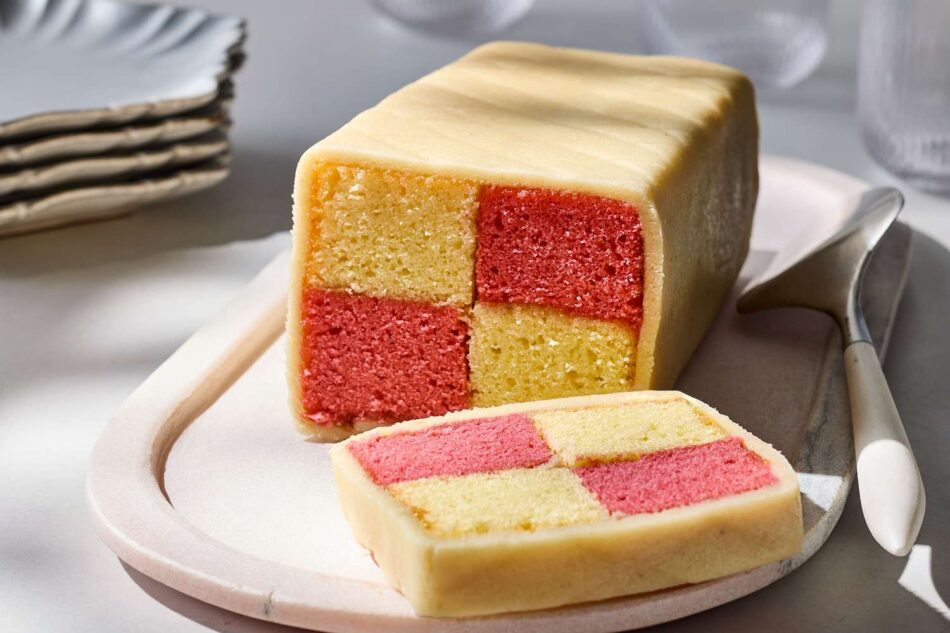- A divider of parchment and foil lets you bake the pink and yellow batters side by side in one pan, saving time and dishes while producing two evenly risen, tender layers.
- Warmed, strained apricot preserves act as a smooth glue, securing the checkerboard so each slice cuts cleanly and travels beautifully.
- A quick two-minute knead turns almond flour, sugar, and egg white into fresh marzipan that wraps crack-free and delivers balanced almond sweetness without tipping the cake into cloying territory.
A Battenburg cake looks like a showpiece, but it’s friendlier than you think. Two tender sponge cakes, one plain and one pink, are trimmed into neat bars, brushed with apricot preserves, and stacked into a checkerboard before being wrapped in marzipan. The result is a teatime classic with a soft crumb, gentle almond scent, and just enough sweetness to feel celebratory without being cloying.
This version keeps the technique approachable for a home kitchen. Instead of baking two separate layers, you can bake both colors at once in an eight-inch square pan with the help of a simple divider of parchment and foil, saving time and dishes while ensuring the cakes rise to the same height. Warming and straining the preserves creates a silky “glue” that’s easy to brush on so the blocks hold together cleanly when sliced. A quick two-minute knead brings the homemade marzipan together, and rolling it between sheets of parchment keeps it smooth and crack-free. A light crosshatch on top finishes the presentation with tearoom polish.
Battenburg (often spelled Battenberg) is widely believed to have been served in honor of a royal wedding in the late 1800s, which helps explain its ceremonial look. But you don’t need an occasion: The cake keeps well, slices neatly, and travels like a gift. Serve it with black tea or coffee, and enjoy the thrill when the first end pieces are trimmed away to reveal that perfect pink-and-yellow pattern — the most satisfying “ta-da” in baking. Clear, tidy steps make this a gratifying weekend project that rewards meticulous bakers and enthusiastic beginners.
A note on red and pink food coloring
Gel food coloring delivers vivid pinks and reds without thinning batter or frosting. Because it’s concentrated, a toothpick’s swipe is often enough, so add it gradually to avoid overshooting. For more natural options, choose products labeled plant-based, heat-stable, and no synthetic dyes. Reach for freeze-dried strawberry or raspberry powder, beet powder, or hibiscus; each adds gentle color and subtle flavor.
What is marzipan?
Marzipan is a smooth, pliable confection made from finely ground blanched almonds and sugar, prized for its mild almond flavor and candy-like chew. To make it from scratch, like we did here, you’ll pulse almond flour and powdered sugar, then bind with egg white and a little almond extract, kneading briefly until smooth. Roll between parchment to prevent sticking.
Prefer a shortcut? Many grocers carry premade marzipan or almond paste. Choose a brand labeled marzipan, 35%+ almonds, for best flavor and wrapping capability.
Notes from the Food & Wine Test Kitchen
- Warming the preserves helps to make the straining process easier. You don’t want pieces or chunks in your preserves. Straining makes it much easier to brush on to the cake.
- Homemade marzipan (made with all powdered sugar) kneads smooth, wraps cleanly, and tastes fresher than packaged, though premade marzipan works too.
- Despite the showy look of this cake, assembly is surprisingly approachable.
This recipe was developed by Melissa Gray-Streett; the text was written by Breana Killeen.






